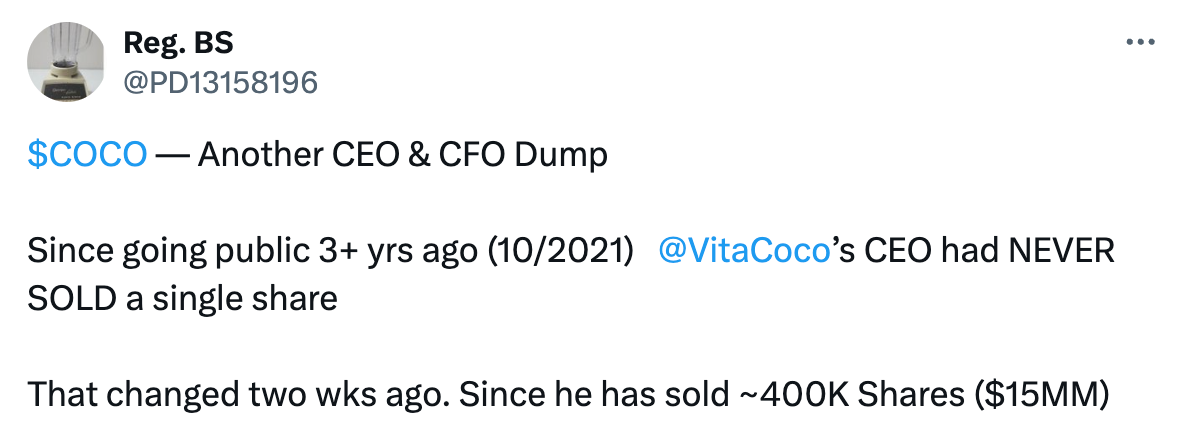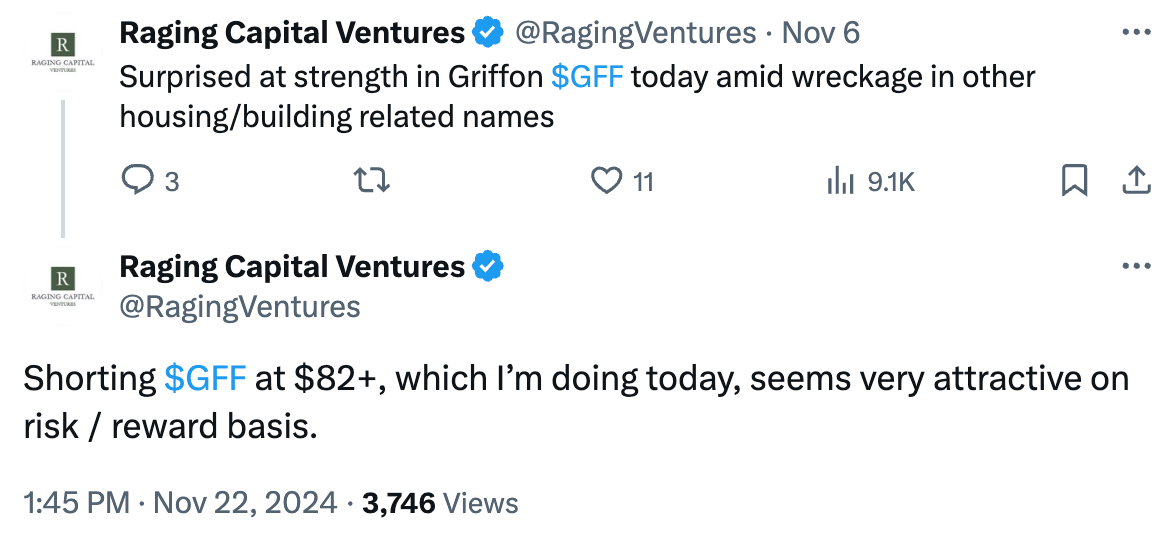Welcome to the 250th weekly edition of The Bear Cave! Our last premium articles were “Problems at Viasat (VSAT)” and “Problems at TransDigm (TDG)” and our next special investigation comes out this Thursday, December 5.
In honor of 250 weeks of The Bear Cave, let’s reflect on how far we’ve come since our first edition. We started in a Stanford dorm room on February 18, 2020 to cover the new growing field of activist short sellers and after a pandemic, controversial criminal charges, and exposing major mainstream scandals, the activist short field is more vibrant than ever. In total, The Bear Cave has looked through hundreds of thousands of tweets, manually analyzed nearly 50,000 executive resignations (~273 per week), and tracked the comings and goings of dozens of new activist short firms. Our weekly emails have now been opened over 5.5 million times!
And since our first paid subscriber investigation on October 1, 2020, The Bear Cave has published on 78 unique companies, about 18 per year. Those 78 companies have risen an average of 3.0% since publication compared to a 43.4% return for the S&P 500. In other words, the 78 companies covered critically by The Bear Cave have underperformed the market by an average of 40.4% since publication — a cumulative total of about 3,152 percentage points of underperformance.
Below is an analysis broken down by year. The Bear Cave only included the first time we published on a company, measured the returns from the closing price the day before publication, and used total return figures (e.g., adjusting for splits and dividends) for the S&P 500 and the covered companies.
In 2021, The Bear Cave published on 18 companies that on average returned -61.0% post-publication compared to +50.8% for the S&P 500 — an average underperformance of nearly 102 percentage points.
In 2022, The Bear Cave published 19 new company investigations that on average returned -2.2% post-publication compared to +51.7% for the S&P 500 — an average underperformance of nearly 54 percentage points.
In 2023, The Bear Cave published 17 new company investigations that on average returned 31.5% post-publication compared to 44.2% for the S&P 500 — an average underperformance of nearly 13 percentage points.
In 2024, The Bear Cave published 18 new company investigations that on average returned 3.6% post-publication compared to 11.6% for the S&P 500 — an average underperformance of 8 percentage points.
And in the last three months of 2020, (our first three months as a paid service), The Bear Cave published six company investigations that on average returned 128.7% post-publication, compared to 81.6% for the S&P 500 — the only cohort of companies to outperform the market.
In short, The Bear Cave is a good place to look for shorts. The qualitative problems highlighted by The Bear Cave have historically been tied to underperformance in the market, meaning The Bear Cave is generally highlighting problems that are either unknown, not in the mainstream, or not priced in. (Disclaimer: The Bear Cave is not investment advice and may not continue to identify companies that underperform in the future.)
Based on the analysis, The Bear Cave seems to do best at identifying companies with product failures or facing obsolescence (e.g., CURI, UAVS, VUZI, SSTI, EMBK, TTCF, OLPX, SKIN, CHGG, and VSAT), particularly in periods of retail investor enthusiasm. The Bear Cave will focus aggressively on this category of companies going forward.
After 250 weeks, we couldn’t be more grateful to our readers — The Bear Cave has never run a paid ad and has never bet against the companies we write about — quite literally 100% of our income, growth, and existence is because of you.
Here’s to the next 250!
New Activist Reports
Fuzzy Panda Research published on ASP Isotopes (NASDAQ: ASPI — $358 million), a pre-revenue nuclear isotope enrichment company. Fuzzy Panda alleged the company has “failed tech from 20 years ago” and is likely being promoted by “microcap fraudsters.” For example, Fuzzy Panda found that a fund managed by Jonathan Honig, the brother of accused fraudster Barry Honig, was previously a large shareholder of ASP Isotopes. Barry Honig was permanently barred from participating in microcap stock offerings, although his brother Jonathan was not implicated. Likewise, the wife of John Stetson, a Barry Honig affiliate previously charged with fraud, was also a major ASP Isotope shareholder.
Fuzzy Panda also highlighted that the company was headquartered at a co-working space in Boca Raton, is actively being touted by stock promotion firms, and has South African subsidiaries that appear to be defunct or non-existent.
ASP Isotopes stock fell ~30% this week following the report.
Independent researcher Lauren Balik published twice more on Zeta Global Holdings (NYSE: ZETA — $4.80 billion), a data and marketing automation company. Ms. Balik said Zeta is “lying to investors” and wrote,
“Zeta uses robocalling/SMS spam, consent farming, and fake job opportunities and sweepstakes to harvest consumer data used to build their identity graph. Zeta is merely a lead list generator - a far cry from their claims of being an ‘AI’ play.”
Ms. Balik also found that Zeta’s leadership runs a venture investment firm that invested in Zeta-affiliated consent farms to unethically collect consumer data.
Iceberg Research reinitiated its short on Quantum Computing Inc (NASDAQ: QUBT — $798 million), an early-stage quantum computing hardware company. Iceberg called the company a “perma-scam,” found that its manufacturing facilities appear to be nonexistent, and noted the company “was financed by Streeterville Capital, a death spiral financing specialist run by a toxic lender who was charged by the SEC for operating as an unregistered securities dealer.”
The company is up about 500% over the last month on promotional press releases that Iceberg said “are based on nothing more than sand.”
Recent Resignations
Notable executive departures disclosed in the past week include:
CEO of Kohl’s Corp (NYSE: KSS — $1.64 billion) “will transition to the position of Advisor to the Chief Executive Officer on January 15, 2025” after two years and will also be leaving the board. Kohl’s incoming CEO, Mr. Ashley Buchanan, has served as CEO of Michaels for the last four years. Kohl’s has had three different CEOs, four different CFOs, and four different Board Chairs in the last ten years.
CFO of Scotts Miracle-Gro (NYSE: SMG — $4.35 billion) “entered into a Separation Agreement” after a little over two years. The company has had four different CFOs in the last five years.
President of Malibu Boats (NASDAQ: MBUU — $860 million) “entered into a Transition and Release Agreement” after nearly one year and previously served as Chief Operating Officer for a decade. The company has had three different CEOs and three different CFOs in the last two years.
Chairman and founder of CorVel (NASDAQ: CRVL — $6.35 billion), V. Gordon Clemons, retired “effective immediately” after nearly 34 years. The Irvine, CA-based healthcare company is up ~36,000% since its 1991 IPO and is audited by Haskell & White LLP.
Data for this section is provided by VerityData from VerityPlatform.com
What to Read
“Macy’s Says Accounting Employee Hid Up to $154 Million in Delivery Expenses” (WSJ)
“The retailer said Monday that a single employee, responsible for small-package delivery expense accounting, had intentionally made erroneous bookkeeping entries since late 2021.”
“Federal Prosecutors Charge Star Investor Ken Leech With Fraud” (WSJ)
“Federal prosecutors on Monday charged longtime bond investor Ken Leech with fraud, alleging he cherry-picked a series of trades to favor some clients while shifting losses to others.”
“Inside The Bear Cave: Edwin Dorsey's Path to Exposing Corporate Misconduct” (SVYEP)
“The Bear Cave is focused on exposing corporate misconduct and actively going and trying to figure out what is going on in the world. The mission today is exposing bad companies and showing people how they can do the same type of research themselves.”
Tweets of the Week
Until Thursday,
The Bear Cave



















Congrats, keep crushing it